#this about chuubo's but also
Text
i love making my own ttrpg characters as much as anyone but i have a specific adoration for any game or module with the chutzpah to go "you're this yahoo and her twenty seven unique neuroses we've sublimated into a mechanical framework"
134 notes
·
View notes
Note
Hi. I just found your The Far Roofs post and I'm smitten by the beauty of the prose and the images it evokes. I'm reading through the kickstarter page and I'm going to look up what I can about the author, but it doesn't do harm to ask you directly too:
I'm not necessarily into playing this or the other games by the author, but I absolutely need to get my hands on more texts like the one you shared about Unicorn. Are the rulebooks the only place to read them? And if so, is there a grander story (that would necessitate reading the books in a particular order) or are these just flavour texts accompanying each new chapter or game mechanic?
Sorry if this is A Lot, I just hadn't read anything like that and it moved me in ways I wasn't expecting for such a brief excerpt.
(With reference to this post here.)
There's a grander story in the sense that, like many of Dr. Jenna Moran's games, The Far Roofs has a default campaign structure with some fairly specific plot beats. Technically the rats and the Mysteries are part of a broader setting set forth in greater detail in Chuubo's Marvelous Wish-Granting Engine (an earlier game by the same author), though it's not necessary to have played or read CMWGE to understand what's going on in The Far Roofs.
If it's the prose in particular that grabs you, however, you might check out Dr. Moran's published novels. The Night-Bird's Feather is probably the most accessible starting point of the lot, being a collection of literary fables loosely structured around the life story of a minor NPC from the CMWGE canon. My personal favourite is An Unclean Legacy, though I wouldn't suggest starting there; it's a less refined and more eclectic work, and getting your hands on an electronic version may be problematic if you're participating in the Amazon boycott, as I don't think the e-book is presently available elsewhere.
(Also, strictly speaking An Unclean Legacy is fanfic with the serial numbers filed off, and if you're going in unspoiled, you will be so mad when you figure out what it's fanfic of.)
362 notes
·
View notes
Note
do you have any feelings on any of jenna moran's ttrpg systems?
yes! i fucking love them. i like chuubo's and nobilis for all the usual reasons people love them (i haven't had the time to check out glitch) but also what's so great about jenna moran's systems is that every last word of them is dripping with voice. every mechanic and piece of flavour text has a perspective, a clear perspective, usually a playful and fun one but sometimes a mournful or angry or wistful perspective too. it's what makes them masterpieces.
honestly though my favourite jenna moran game is one i haven't played and likely never will because it's not super playable and it doesn't really seem meant to be played: wisher, theurge, fatalist is a masterful and fluent thesis on game design disguised as a shitpost disguised as a tabletop roleplaying game. some highlights:

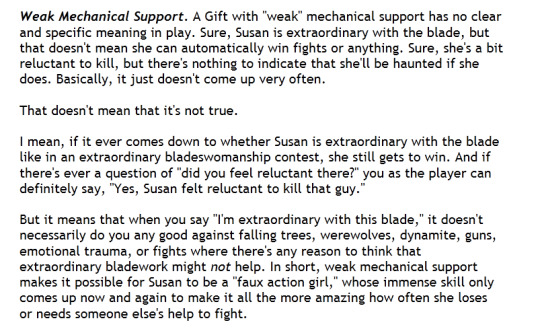





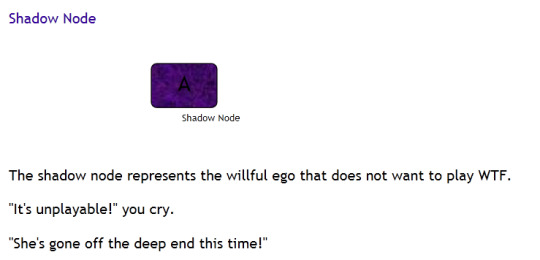



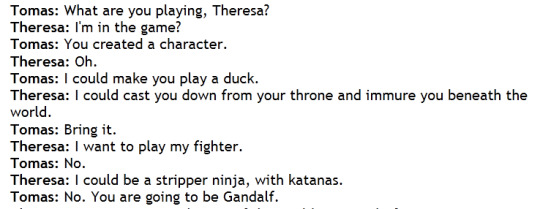

922 notes
·
View notes
Note
Do you have any games that involve urban fantasy with less focus on fighting than something like Dresden or Shadowrun?
THEME: Urban Fantasy (Minimal Fighting)
Hello there! What I've got here is quite a mix, I wasn't sure how much violence you wanted (or didn't want) so I have a little bit of romance, a little bit of nostalgia, and a little bit of horror!


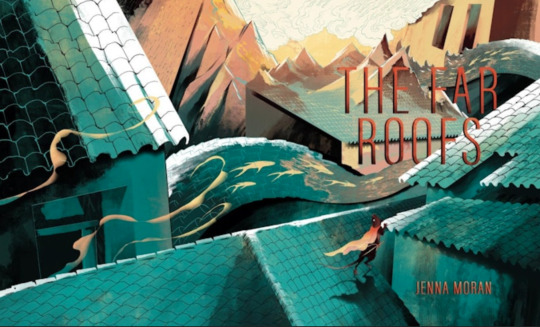
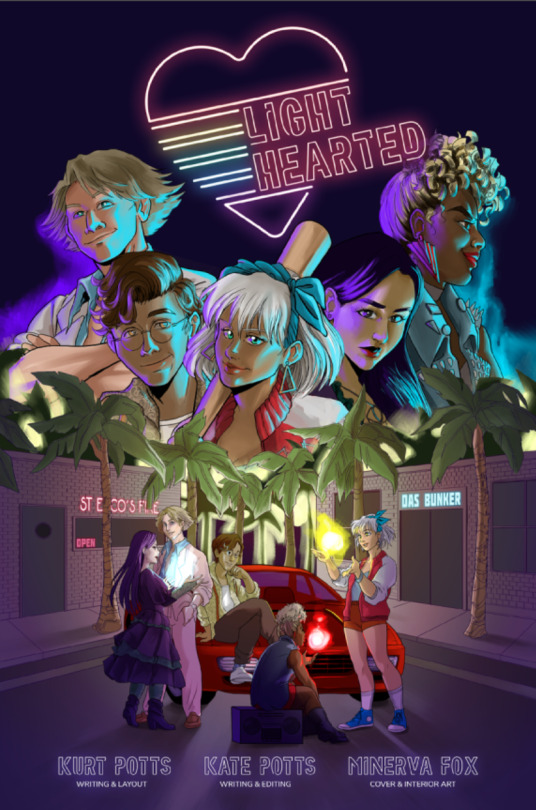
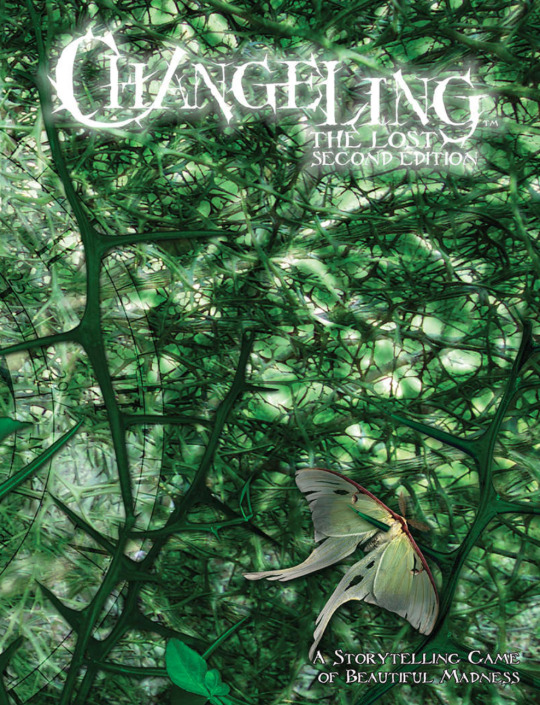

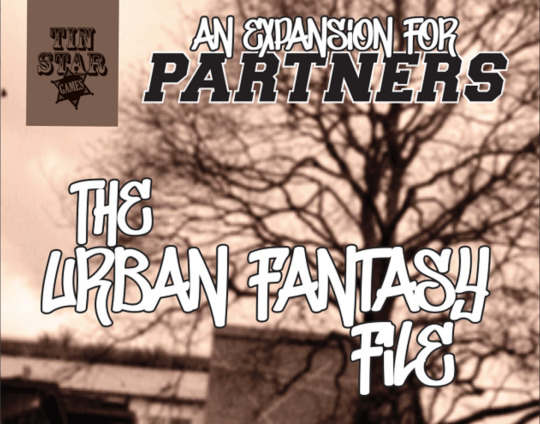

City of Mist, by Son of Oak Games.
City of Mist is a role-playing game of film-noir investigation and super-powered action. It is set in a modern metropolis rife with crime, conspiracies, and mysteries. The protagonists are Rifts, ordinary people who became the living embodiment of a legend, their Mythos. While your Rifts may seek to strike a balance between the mysterious nature of their Mythos and their mortal aspirations, the powers within them always threaten to tear their lives apart. They have unwittingly become a part of a secret world of clashing stories, and soon other legends will come looking for them with demands.
City of Mist is a combination of PbtA and FATE, giving your characters descriptive tags to use for both their benefit and their detriment as they go about solving mysteries in a supernaturally-saturated city. The primary theme of the game is mystery, and thus more than anything your characters will be primed for investigation. That’s not to say that there isn’t violence - but violence and fighting can be de-emphasized if the group is more interested in the mystery side of things.
Character Creation involves a combination of mundane and supernatural themes, as your character is endeavouring to strike a balance with the parts of themselves that they recognize (student, parent, office worker, ex-partner) and the parts of themselves that are hard to understand (mythical beast, deity, folktale, urban legend). What’s important to define is your daily routine, your personality, and what kind of supernatural powers you have.
This game isn’t explicitly anti-violent, but it absolutely provides you with ways to solve problems that aren’t violent, so I think City of Mist is worth checking out.
Scary Monsters & Nice Sprites, by Pammu.
Scary Monsters and Nice Sprites is a narrative RPG about spending your night in one of the only clubs in your city that’s safe for creatures of the night like yourself. All you want to do is have some fun just like the humans do. Play a supernatural creature of choice, put some sick EDM on the speakers and get your game on!
This game works best for an even number of players, up to 6, and is GM-less. It combines urban monsters with flirting, dark clubs and hookups. Each of your characters will look for a partner by doing things that will appeal to the other players. If they like what you do, they’ll reward you with tokens, which you can spend to improve the atmosphere of the club. Fill another player’s intimacy meter, you’ve won them over, and the two of you decide how the night ends for both of your characters.
If you want a game about flirting and the magic of a nightclub, this is your game.
The Far Roofs, by Jenna Katerin Moran.
The Far Roofs is an original role playing system and bundled campaign using pens or pencils, paper, six-sided dice, ten-sided dice, playing cards, and a bag of letter tiles. It's complete in one volume: with this one book and the equipment above, you'll have everything you need to play.
As the story progresses, your characters will gain access to over 150 unique, narrative-focused powers developed and refined over the course of a decade for the Chuubo's Marvelous Wish-Granting Engine RPG before being simplified and adapted for use herein.
The Far Roofs is still being Kickstarted, but Moran’s work on Chuubo’s Wish-Granting Engine produced a game that emphasizes wonder and emotional experience. The Far Roofs looks to deliver along the same lines, and the examples of play point towards investigation, social interaction, and magic powers. Jenna Moran is also known for her unique and evocative storytelling in her work, so I think it’s definitely worth checking out.
Lighthearted, by Kurt & Kate Potts.
Welcome to the magical 80s dream world of Lighthearted. You are a Prep, Jock, Geek, Rebel, or Outcast, like those kids in The Breakfast Club, except you are just about to start magic community college. Through play, we'll explore how you grow out of your high school cliques all while dealing with magical mishaps, college parties, vampires, and worse—finals!
Lighthearted is a complete tabletop roleplaying game that uses the language of film and television to reimagine the coming of age stories popular in 80s teen movies like Weird Science and Sixteen Candles, but with a modern fantasy spin. It's set in an alternate 1980s with fantasy elements weaved into the most outlandish bits of 80’s pop culture. There are fantasy religions mixed in with mall culture, dark magic cold wars, and magical glamours instead of plastic surgery.
This is a game of magic and coming-of-age, as you play first-year students at a magical community college. You’re off to the big city, and the big world - will you survive your first college party? Your first vampire?
The whole game feels like the neon lights of a vibrant night-life combined with the nostalgia of an 80’s film. Your magic is attached to how you feel, so as your emotions change, so will your effectiveness at certain actions. If you want a game that’s as light as its name, and you are seeking out rosy-tinted nostalgia, this might be your game.
Changeling: the Lost, by Onyx Path.
Once upon a time, they took you from your home. They promised you a place at their side, and meaning in your life, and they surrounded you with beautiful things. But the beautiful things were oh so sharp, and they laughed when you bled.
Day by day, they changed you. But day by day, your will grew stronger. On the last day, you smashed your way through the beautiful things and ran, not noticing as you bled or feeling as you cried.
You fought with courage and cleverness and took yourself home. Now the beauty and the horror are yours, to have and to hold and to live.
Welcome to once upon right fucking now.
So I’m familiar only with the 1st edition of Changeling, but as far as I understand, the setting and core premise of the game is the same in the 2nd edition. Changeling: the Lost is a game of fairy trauma. Your characters are survivors of a fae horrorscape, a place both wondrous and terrifying all at once. This game is solidly in the horror genre, but it contains within it a taste of the magical, and it’s also the reason I got into roleplaying in the first place.
As in many Chronicles of Darkness games, fighting is an option in here, but it’s not a wise option. Getting into fights pulls at your characters’ ability to understand the difference between our world and the world of Fae, it’s very easy to sustain supernatural damage that is hard to heal, and, well, sometimes it’s hard to tell who your real enemies are in the first place.
I’d say that Changeling is more of a political game than anything else. Your characters will have to dance through the highly literal wording of faerie pledges, and untangle difficult relationships between Courts that are both safe havens and potential beds of sedition. This is a violent game, but much of the violence possible in Changeling isn’t physical - it's emotional.
This Night On The Rooftops, by C.M. Ruebsaat.
This is a game about gazing out over the smokestacks after dark, with the wind in your hair and a friend at your side and a thousand lights of progress on the streets below.
This Night on the Rooftops is a collaborative storytelling game for 2-5 players about friendship, growing up, and revolution. You will play members of a gang of children in The City, a fantastic world of industry and dying magic, where witches labour alongside factory-workers to make ends meet.
This game looks slightly less modern, but it takes the fantasy aspect of witchcraft and places it inside an industrial city. The game uses a modified version of the No Dice No Masters rule set, which is excellent for stories that have an ebb and flow to them, managed through the use of token expenditure. This game is also GM-less, giving everyone at the table the same amount of control over what happens next.
Since the characters are a gang of teenage witches looking to make ends meet, this game doesn’t strike me as one that prioritizes fighting or violence. The city looks big enough to grind up the characters if they’re not careful, so they’ll likely have to find solutions to problems that don’t get them (or their dependants) in trouble. If the game is like other No Dice No Masters games that I’m familiar with, the group will also have a big say over which elements of the city are the most intriguing to them.
Partners: The Urban Fantasy File, by Tin Star Games.
Some murders are just elf defence…
Vampires are real, magic is real, elves are real - and murder is still very very real. This expansion takes you and your Partner down the moonlit streets of urban fantasy, where the dead sometimes get back up again but crime is still a mystery needing two heads to solve.
The base game for this, Partners, is a two-player mystery-solving game about a pair of detectives, a straight-shooter and a wildcard. You’ll need the base rules to play, but this supplement brings in dead elves, suspicious vampires, and other common characters in any urban fantasy genre. It can work as a one-shot, or as a series of episodes. If you want a game that's primarily about solving a mystery more than anything else, this is is for you.
Solacebound, by Sascha Moore.
Young monsters played at the boundary between the worlds. They slipped and stranded in a human city. Isolated and unwelcome, they search for each others help and a way back.
Solacebound is a GM-less Game for 3-5 people to play over a few hours. Search a sprawling, oppressive city for your friends, find out who is willing to give you a roof, bash back against authorities, cook together and console each other. Will you find a way back home before all passages close?
You are teenage monsters trying to find their way through an urban environment, in a place that is hostile to them. You survive by hiding out, finding each-other, and do things together to make sure you keep each-other healthy. Cards from a deck act as resources, but also as an oracle to help you describe the fallout of any given action, and the emotions that are attached to it. This is a game about metaphors, about what it is like to live in a place that fears you, so I definitely recommend making sure the entire table knows what this is about before starting a game.
You Might Also Want to Check Out
Subway Runners, by Gem Room Games.
123 notes
·
View notes
Text
There is another world, you see. Right next door to our own
If you go up ...
If you go up, and you run the roofs like the rats do, you'll find the roofs getting closer and closer until eventually they merge; until you can’t see the houses any longer beneath them. If you keep going from there, you’ll discover whole landscapes that have been hiding above us: strange fairylands, magic gardens, inexplicable towers; all manner of wonders.
There’s this whole world of magic, and to get there, you just go up, over, and on for a bit.
... regrettably it is the demesne of the Mysteries.
This is Jenna Moran's newest game, using a derivative of Chuubo's Marvelous Wish-Granting's system with some new twists and the introduction of new oracle technologies about going on adventures with rats and fighting terrible and numinous god-monsters, the Mysteries!
Oracle technologies?
You're rolling dice, you're drawing cards, you're assembling scrabble tiles to address your problems. All the classics.
But isn't Chuubo's and all that a whole big family of games I'd need to learn first?
No worries! While The Far Roofs is a Chuubo's spinoff, it's written to be standalone and playable without any knowledge of the setting- in fact, it's written such that many games can be set in your normal life, like a sort of portal fantasy situation full of cool rats
Tell me about the cool rats
The Fortitude Rats are rats that gained gained intelligence and grew to be two or so feet tall when they stood upright (which they can do). They're a bright and passionate people, and they make it their business to fight with the Mysteries, numinous monsters and gods that exist on the Far Roofs. Everyone sets out with a group of rats, who in this game are described with various archetypes, like some sort of commedia dell'ratte
Will I get to sit with my feelings as I look out over windswept familiar-yet-alien roof vistas before going to fight a terror that's haunting my life, but also maybe that I've fallen in love with?
Oh You Know It
82 notes
·
View notes
Text
Propaganda and explanations under the cut.
Prophecize:
Your character may only use this once.
You may state something about the world that is unequivocally true. This could be something like, “The enemy will show up here at this time” or, “The barriers between worlds are no longer passable.” You get one sentence with one main idea, and you can only do it once. Spend a Link.
Further errata: This move can only be taken once, by anybody. That means if your friend took this move, then it’s gone. It’s a one hitter quitter so use it wisely…Or don’t, wish for a fish. I’m not going to stop you.
What makes it Cool?
In a game where the canon is already nebulous, the person with the power to all at once say "THIS IS WHAT SHALL COME TO PASS" is incredibly powerful. I've also never seen a move couched as "this can only be used once, in one game, BY ANYONE" and that's so awe-inspiring that it suddenly comes with all the same gravitas mechanically that it does narratively.
World Breaker's Hand:
You’ve inherited some of Melanie Malakh’s power to break the world. Just focus on something you can perceive, within about a quarter-mile of you; judge it as unworthy of existence; and bam! It shatters and turns to dust and then into nothing at all.
This power of unmaking is overwhelming—in fact, it’s worse than you’re probably thinking, because it’s not strictly limited to things. You can kill the sound of footsteps, the shine of a streetlight, the shadow of an ant, the amusement value of a puppet, or the hand of
the puppeteer. You can take the weight from a door or a window from a house, and it’s basically up to you at the time whether that leaves a hole or just a “there
isn’t a window there” after. You can kill time before an appointment, tone down the salt on an over-salted meal, or snipe a single feather from the wing of a flying tern. You can even do this stuff remotely when visiting someone in the guise of the Dream-Witch’s Shadow
or A Waking Dream, below.
This is the power of the Bleak Academy—a power of unmaking, of the Outside. So if you blast something that people love or need, or toy with someone to excess, they may be able to invoke the rules for fighting the Bleak Academy to stand against you.
What makes this cool?
Chuubo's is full of abilities that would be insanely overpowered in any other game, but due to the focus on slice of life they end up playing out very differently. This is the writeup for the ability on the premade character Miramie Mesmer, and she's mostly horrified that this is something she can do! When it does get used, its fun to argue what exactly happens - if I erase my failing grade on my math test what happens? Do I have to take it again? Does the teacher realize she needs to grade it again and I end up where I started?
40 notes
·
View notes
Text
Just in time for Halloween, I've assembled and expanded on a few of my old projects. If you're a fan of Chuubo's Marvelous Wish-Granting Engine, I suggest that you check out Student Follies!
What does it have? It has my old Patreon campaign, Masters of Evil, in which you play as the Seven Sins of Principal Entropy struggling to gain control over School, and thus over life.
It has a Chuubo's one-shot adventure I designed, in which five students and their chaperone descend into a ruined factory in Old Molder on a field trip and encounter a group of rogue Riders trying to unmake reality!
It has a campaign in which every single character has the ability to rewrite reality as a wish once per chapter, and also NPCs can't instinctively be hostile to any of them. Not one!
It has the following entry:
"Your dumb creator made you to be as smart as them, and then set you to a task that they explicitly felt too smart to bother with, and you are seriously going to have words with them about it the next time that you see them. But at the same time, you have the same desire as them not to sully their good name, and you’re not about to build a robot to do your homework for you because you would have to make it indistinguishable from yourself in order to not suffer embarrassment if it were to make a mistake, and if you do that then it will just be frustrated and upset that it has to do your homework.
It is a pickle."
Check it out! Let me know what you think!
28 notes
·
View notes
Note
18 & 29 for the ask game?
18. What’s one of your favorite lines you’ve written in a fic?
oh fuck man this is hard there's so many. uhHH. there's a lot of parts of fta i think are really good, though a lot of them are more than one line. this one mr. wolf is maybe my favorite:
There’s something in the air here that sets my teeth on edge and makes them sharp. It makes my fingers itch. There’s something sticky under my fingernails.
(Pause)
False. It’s good False isn’t here. False and her eyes.
(Pause)
What did Scar say about my eyes, again?
also one from just the other day but for something prosier i am actually really happy with the last line of i bet you never expected me, originally i had a few more lines after this but i cut them and im REALLY happy with the result i just think it hits really good.
He rolls his eyes upwards so he doesn’t have to look at the camera. The studio lights are blinding. “I don’t believe you.”
29. Share a bit from a fic you’ll never post OR from a scene that was cut from an already posted fic.
went digging through the Notesapp Folder where i do all my work and found this bit from a fic that will almost certainly not be properly written but IS pretty fun. if written it would be an au of chuubos marvelous wish-granting engine where instead of a complicated machine theres a hole. in the ground. that you throw diamonds into
“Huh,” Pearl said. “That’s… weird.”
“What’s weird?”
“Have I got pupils?”
Grian blinked. “What?”
“Look,” she said, tugging him around to face her. Her eyes were two flat slates of silver, ringed with white. “Have I got pupils?”
“Nooooo,” Grian said slowly. “Are you… supposed to?”
“Well, I did last time I checked!”
“Grian,” Mumbo hissed anxiously. “You don’t think this is some sort of Wishing Pit side effect, do-"
“Of course not,” Grian said. “The Wishing Pit never has unexpected side effects.”
i also found this bit from the start of. a season 6? 7? fic, which i think was gonna be mostly abt grian and jimmy's first post-evo meeting at mcc? i honestly dont remember most of what i had intended for this one
Xisuma: Heads up, everybody, Scott’s going to be stopping by to hand out invites to the next MCC!
Xisuma: He said he wanted to talk to False, Ren, Cub, and Iskall, but anybody who wants to say hello, feel free to swing by spawn.
Grian glanced up from his phone, eyebrows raised. “Who’s Scott?”
“Oh! I forgot you wouldn’t know,” Mumbo said. “Scott- Smajor is his actual, like, legal name, I think, but everybody calls him Scott, I don’t know why- he runs this big championship event that’s made up of a bunch of little minigames, with lots of people from different worlds competing.”
Grian hummed thoughtfully. “I like minigames,” he said.
“Oh, you’d probably have a grand time, honestly,” Mumbo said. “Too rich for my blood, personally, but Scott had said he was looking for more hermits to play- it was just False and Ren last time. Want to go say hello?”
25 notes
·
View notes
Text
The Byronic Hero Bracket: Qualifying Round Batch G #8
Leonardo De Montreal from Chuubo's Marvelous Wish-Granting Engine vs. Ulfric Stormcloak from Skyrim
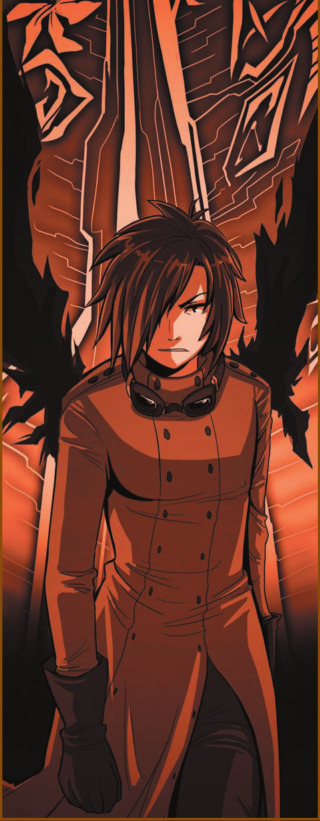
Reasons under the cut (spoilers for both)
(All sources from TV Tropes)
Leonardo De MontrealLeonardo De Montreal runs down each point on the checklist, to the point where his heroism is at least fifty percent based on how much better he is than anyone else. Raised in an abusive orphanage, suffered long-term emotional isolation, literally and figuratively ripped his heart from his chest, and spent a year at the Bleak Academy (which is a metaphor for bleak enlightenment when it's not a metaphor for death). He avoids sleeping for long periods of time lest his nightmares drip out into the world, requires the Mechanism of Original Sin to have a facsimile of conscience, and is metaphysically incapable of having friends or equals. He gains extra XP for ranting at length about his superiority. On the other hand, he's also personally replaced the source of all light and hope in the universe.
Ulfric Stormcloak:
In The Elder Scrolls V: Skyrim, Ulfric Stormcloak, Jarl of Eastmarch and the leader of the secessionist Stormcloak rebellion. A gifted and intelligent man, shrewd in rule and one of the few people to be able to use the Thuum besides the Dragonborn and the Greybeards. Deeply charismatic and able to unite half the country around his ideals of restoring the Nord kingdom to its former glory. A great warrior, generous to his followers yet merciless to his enemies and extolling courage and strength while punishing cowardice and corruption. Also gives a hell of a speech. But also deeply morally flawed (though well-intentioned), controversial among those who are not his followers, and at times even questions himself if he is the right man to lead Skyrim into a new age.

#character tournament#fandom tournament#tumblr tourney#tournament poll#poll bracket#polls#tumblr polls#fandom bracket#tumblr bracket#character bracket#byronic hero#leonardo de montreal#chuubo's marvelous wish granting engine#ulfric stormcloak#skyrim#the elder scrolls
5 notes
·
View notes
Text
In most of our D&D games we've instituted a system similar to Heart, the City Beneath's beats as a way to distribute inspiration. You pick three triggers to be active for the current session, and can claim inspiration when you hit them.
When I started playing my paladin, I envisioned him as someone that had a tendency to hold grudges - the main one being that he had a pretty serious falling out with his family. Due to who the other PCs were, I knew that I was going to be drawn into interacting with the focus of my PC's ire despite what my PC wanted (and I as a player was excited about it) so one of the initial beats I wrote was aimed at rewarding me for making a mess of things when my character wouldn't let things go: "you allow a grudge to complicate your life."
As I played him though, I found myself often in a situation where this aspect of my character wouldn't come up in the way that I had thought it would. The stakes of what had happened with his family and where that relationship would end up going hovered over everything, but unless it was the direct focus of things my character ended up getting along with most people. I considered inventing a lot of people to be holding onto resentment against, but I already had the biggest "footprint" of associated NPCs out of anyone and was loathe to add more to it.
Instead I decided to broaden the beat to "Someone's grudge complicates your life," and I've been really pleased with that. I realized that in fiction, when a character has something that they're wrestling with and they encounter someone else in the same situation it's a reflection of their own issues. You want your revenge obsessed character to encounter other people who want revenge, or got it and regretted it (or didn't), or want revenge against them and get all tangled up in the situation because that is what their story is about.
Even if my character doesn't come right out and talk about how whatever grudge we're getting tangled up in relates to his own situation, claiming the beat is planting a flag and saying - "This is important." Having the trigger written down also helps remind you that it's something important to your character - last session we got halfway through a fight with some revenants who were obsessed with revenge before I remembered that I had chosen the "grudge" beat and it suddenly cast everything in a different light.
It's a bit like XP actions in Chuubo's that way - you can help someone with their chores and have a meaningful conversation, but the act of declaring that its an XP action adds an additional layer of importance to it.
2 notes
·
View notes
Note
Just saw the post you rbed about dnd and it's issues as a game, it's a really good concise setdown of every issue I've had with dnd. I'm not familiar with other TTRPG systems, though I was thinking about getting into GURPS since it sounds way more open. Do you have any systems that you'd recommend?
it really really depends on what u want out of a game. indie games tend to be much more specific in their focus, so ur more likely to find a game that does like, murder mystery at a spooky boarding school, than a game that does Generic Adventuring. my recommendation is just to explore, and think of some settings and themes youd like to explore
however, there's a few systems that are kinda de facto most used in the indiespace i believe. powered by the apocalypse is based off apocalypse world, and i really love it. it uses 2d6+mod to play very narrative games that still have a good amount of chunkiness. belonging outside belonging is also really common and uses a token economy to create a system thats very close to just freeform roleplaying. there's also a variety of OSR games that are closer to dnd combat stuff but im not as familiar with that space
re: gaming reccs, i have great things to say about @temporalhiccup's apocalypse keys, which is coming out in the next week-month i believe? its about being mystery solving monsters for the government a la hellboy. i also think troika is a really classic OSR game that i've enjoyed. under hollow hills is one of my favorite games ever, about a traveling faerie circus. if you're looking for some really weird stuff, chuubo's marvelous wish granting engine is a cult classic. if any of my followers have suggestions id love to hear them! im definitely in the woo woo feelings game camp so i cant speak much to crunchy action games
#also honorable mention to yazebas bed and breakfast which isnt coming out for a few months but is my favorite game ever#my other secret tip is that most games exist as a structure for you to have fun on#so you can choose most indie games and have fun with them#the reasons why i want to move away from dnd are less so that you cant have fun w it and more so that i dont like wotc and it's got some#shit baked into the fabric of the game
28 notes
·
View notes
Note
Glass-Maker's Dragon specific question: how does discrepancy in "powers on character sheet" tend to shake out when there's a Fortitude PC?
One of my friends primarily loves exploring RPG settings by creating his own characters. He also tends to be the most char-op focused of my friends when we've played games like Pathfinder. I'm worried that if I ran GMD with him he might get frustrated if the only "make a character from scratch" choice is meaningfully "weaker" or less influential in play.
the fortitude PC does indeed start out with fewer miracles than the premade PCs in the glassmaker's dragon. i wouldn't sweat it too much, "power level" is a little handwavey in a game where miracles are ultimately more of a flourish and a creator of plot devices than something you meaningfully move a quest forward with; getting to optimize one's own skill layout into stuff that's directly relevant to one's quest goals is honestly a much quicker way to be meaningfully "overpowered" in chuubo's (i.e. look at natalia's playbook, she can resolve just about any problem with willpower alone so long as it doesn't involve opening up to people) and farm experience.
see if you can describe the game as one where traditional ideas of "power level" don't really matter and let them in on the secret that big miracles hinder you in the early-game more than they help.
8 notes
·
View notes
Note
hey! I'm getting back into Tumblr and I only remember your Tumbls and one other so I'm interested to hear who you would suggest following for fun content. Nerdy, funny, any one you like seeing on your dashboard!
Sure thing. I actually don’t follow that many blogs on Tumblr – there’s usually fewer than a hundred active entries on my “Following” list at any given time – and a lot of them are people who wouldn’t appreciate the extra attention, but I have a few I can plug.
Tabletop RPG creators
There are surprisingly few RPG creators on Tumblr, at least openly – though I'm sure there are many more who prefer to keep their Tumblr identities separate from their work! Those whom I follow include:
@jennamoran – Dr. Moran likely needs little introduction for most who follow this blog; creator of Nobilis, Glitch, and Chuubo’s Marvelous Wish-Granting Engine.
@jdragsky – Founder of Possum Creek Games, and creator of Sleepaway, Wanderhome, and the forthcoming Yazeba’s Bed and Breakfast.
@nekoewen – Creator of a truly vast number of smaller games, most notably the West End Games Ghostbusters retroclone Spooktacular, and also 100% to blame for my obsession with d66 tables.
@open-sketchbook – Author of many of my favourite games, including Double or Nothing, Unbelievable Macho Bullshit, and their current magnum opus, Flying Circus.
@orbitaldropkick – Putting them under tabletop RPGs may be burying the lede, as they’re also the author of Kill Six Billion Demons, but we know what we’re here for. Lead designer of Lancer.
Artists
These are mostly (but not exclusively) folks I’ve worked with in the past on my own tabletop RPG projects; many currently accept commissions if you’ve got a project of your own the works:
@artbyprophet – Contributing artist for Costume Fairy Adventures.
@artkaninchenbau – Contributor to Cerebos: The Crystal City and cover artist for Gaming with Godot.
@catbatart – A frequent contributor to various tabletop RPGs, including a forthcoming project under my own banner that I’m not ready to discuss just yet.
@dizzimitzi – Contributing artist for Costume Fairy Adventures.
@fungii – Contributing artist for Costume Fairy Adventures.
@mimimariet – Contributing artist for Costume Fairy Adventures.
@mooncalfe-art – If you’re into older tabletop RPGs, you may know her as one of the original artists for Exalted; otherwise, her graphic novels like Shadoweyes and Wet Moon are probably more familiar.
@pencilbrony – Cover artist and graphic designer for the forthcoming Space Gerbils [working title].
@theshitpostcalligrapher – Their main thing on Tumblr is (as the name suggests) calligraphic renderings of trending shitposts, though their full repertoire is much broader. Cover artist for To Serve.
@tredlocity – Creator of the webcomic Val and Isaac and occasional tabletop RPG artist, though I haven’t worked with them personally.
Video Games
Some video game creator blogs, some blogs about video games:
@hollowtones – A streamer who’s participated in several popular projects, including Half-Life VR but the AI Is Self-Aware, though on Tumblr she’s probably better known for a certain post about frogs.
@orteil42 – Creator of Cookie Clicker. If you’re familiar with that game’s sense of humour, you know what to expect here.
@ponett – Creator of the forthcoming Super Lesbian Animal RPG.
@snapscube – A voice actor best known for “abridged” versions of popular video game cutscenes. You know the “Dr. Eggman pissing on the moon” meme? That’s from their podcast.
@suppermariobroth – Oddball and often deeply obscure trivia about Super Mario games, as well as related franchises.
Other
@seatsafetyswitch – Frequently surrealist microfiction, with a strange preoccupation with shitty old cars.
606 notes
·
View notes
Note
Do you have recs for combatless rpgs? sorry if someones asked this ! im getting into ttrpgs now and its just pretty hard to find anything non combat focused ?
i recommended wanderhome (melancholy animal roadtrip), dream askew (queer postapocalyptic survival), microscope (collaborative worldbuilding), and crescent moon (kids learning and growing in a fantasy land) in resposne to an ask earlier today. other great rpgs that aren't combat focused include:
chuubo's marvelous wish-granting engine: i'll level with you, if you're just getting into rpgs this one might be A Lot because it's quite mechanically complex. but it's a beautiful game about having ghibliesque coming-of-age adventures in a surreal dreamy world.
nobilis is by the same person (jenna moran, a genuine game design pioneer and genius) -- it's about being godlets, the living embodiments of concepts from the concrete to the abstract. you might find yourself fighting in this game, but it's unlikely to look anything like 'combat'.
brindlewood bay, which is about being elderly women investigating murders.
pasión de las pasiones, a pbta (powered by the apocalypse) game about doing ridiculous romance drama shit based on telenovelas
monsterhearts, about teenaged monsters having weird drama and exploring their sexuality. think buffy or twilight, but queerer
pigsmoke, about being professors at a college of magic and competing to see who can publish the best paper (yes, really)
the girlfriend of my girlfriend is my friend, about... i mean i think the title makes it pretty clear! being gay and poly and kinda broke
it's been a long, long, time, about two people who used to date, their relationship, their lives after it, and their reunion
sagas of the icelanders, about being viking settlers in iceland during the saga period and playing out quasimythical dramas
hieronymous, about being a bunch of sinners making your way across hieronymous bosch's garden of earthly delights
thousand year old vampire, a solo journalling game about being a vampire and living through long stretches of history
blow up hamlet, where your table performs hamlet while changing the plot and improvising new plot beats at semi-random
slugblaster, about being rowdy teens hoverboarding through interdimensional rifts in the spirit of 90s teen movies
woo! that's a fuckin' lot of ttrpgs, but i wanted to give a lot of suggestions because i think it's so important for people getting into the hobby to understand the breadth of games out there and how far from the popular image created by D&D they can go! there are two-player and GM-less and even one-player games on this list. you can do anything! the world of rpgs is so fucking wide and beautiful. good luck and i hope you find something that speaks to you!
(oh, also, my game, most trusted advisors -- about being the untrustworthy privy council to a dipshit king and falling over each other's nested dipshit schemes -- has no combat in it. just saying!)
759 notes
·
View notes
Note
Hello! I’ve been following you for a bit now, and all of your recommendations have been super cool and interesting! If you don’t mind me asking, do you have any recommendations for really long indie ttrpgs? One that could match the length of dnd or CoD books, I mean. The specifics don’t matter as much, I just really like sinking my teeth into long game books like that.
THEME: Long Indie Games
Hello friend! Fear not, I have a multitude of long indie games to recommend for you!
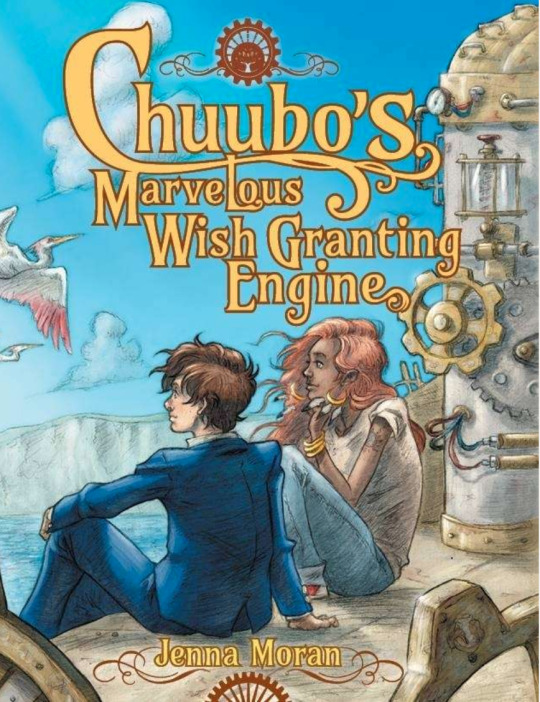
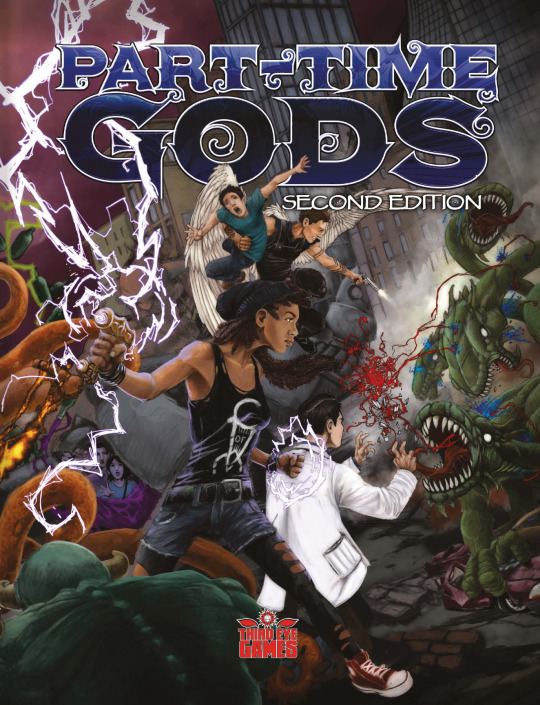

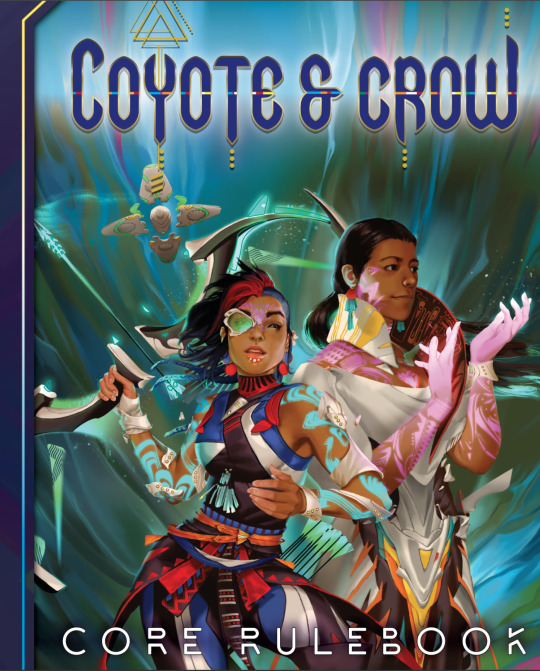
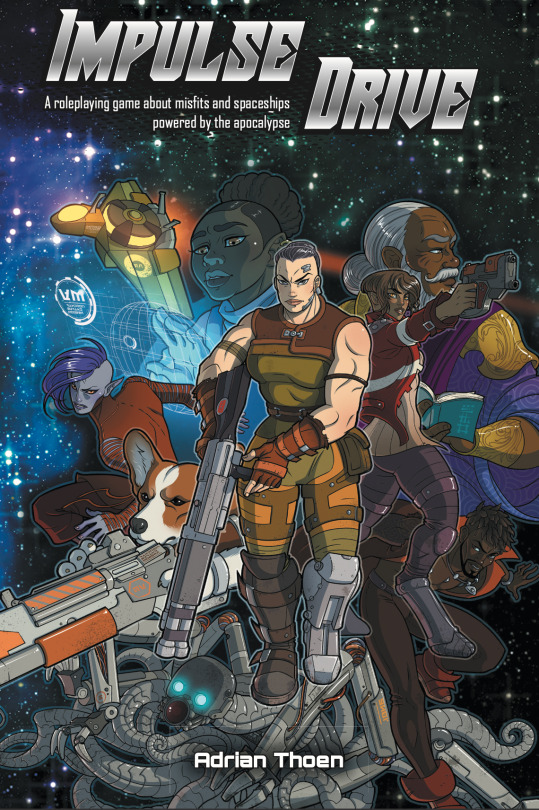
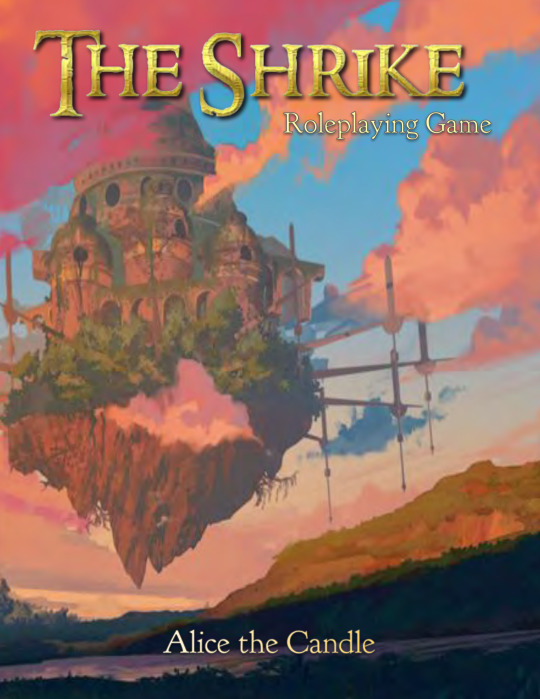
Chuubo’s Marvelous Wish-Granting Engine, by Jenna Moran.
Length: 578 pages.
The Chuubo’s Marvelous Wish-Granting Engine RPG is the diceless RPG from Jenna Katerin Moran, author of the well-regarded Nobilis and an important contributor to Eos’ Weapons of the Gods and White Wolf’s Exalted RPG.
Chuubo’s is a special beast. I personally don’t know how one actually plays this game, but the book itself is fascinating to read. It has recognizable parts such as character skills, Health Levels, and XP, but I think I’d want to sit down with a physical copy to be able to properly read it and get a handle on how you play through a story. If you enjoy a challenge, or even just something enchanting and evocative, I’d recommend Chuubo’s.
Part-Time Gods, by Third Eye Games.
Length: 318 pages.
The gods of today are shadows of what the old gods possessed. Their power has been heavily diminished, and many choose to live a regular, mortal life, revealing themselves as gods only when absolutely necessary. The reason for this is twofold. First, fate doesn’t like it when the gods share their secrets with a mortal. Unless they are the god’s worshipper, terrible events and horrific accidents have a way of happening to the people closest to the god. Secondly, divine works attract creatures and monsters called Outsiders, created by the Source (after its capture) to destroy any god they encounter.
This is a game that’s on my TBR shelf - and it might stay there for a while, because this is another pretty lengthy book. I am very grateful for the index at the back of this book, because I think this would be pretty difficult to navigate. Part-Time Gods is set in the modern-day, but the premise behind your god-hood is very unique, so one of the first chapters is dedicated to telling you what exactly it means to be a part-time god, part-time taxpayer. The book also contains small pieces of prose set in the world, meant to give you a flavour of the genre and tone intended by the designer. I’m really interested in the concepts expressed in this game, and I hope I have enough brain space to read it in the future!
We Are All Mad Here, by Shanna Germain.
Length: 226 pages.
Jack climbing the beanstalk. The little mermaid finding her voice. Alice struggling with the madness of a place unruled by the laws of reality. The queen. The child. The woodsman. The knight. When you think about fairy tales, who do you become? Where does your imagination take you?
We Are All Mad Here is a tabletop game about fairytales and mental health, providing you with new options for the Cypher System while also creating a setting about visitors to a magical land called the Heartwood. In the fiction, only those who have had some kind of struggle that affects their mental health are able to travel to this magical land. Germain intends this to be a way to tell a narrative about mental health using allegory and metaphor. The Cypher system itself is pretty complex, and you probably won’t be able to play a game of We Are All Mad Here without the core rulebook, so it might be worth it to take a gander at the Cypher System Rulebook while you’re at it.
Coyote & Crow, by Connor Alexander.
Length: 484 pages.
More than 700 years ago, a massive disaster changed the course of history. The world was plunged into centuries of darkness, but the event also introduced the Adanadi — the Gift — a strange mark that appeared on all life. This mark would have an enduring impact on humanity. Centuries later, the Earth is healing. New, advanced nations have risen. Ancient legends stir.
Coyote & Crow is a pretty extensive and unique game, using pools of d12s pulled from your stats, as well as narrative beats such as character motivation, Gifts and Burdens to help give your character a personality. Because it introduces an alternate history and a drastically different future, the core book as a decent amount of lore to acquaint you with the city of Cahokia and the world that surrounds it.
This game has quite a bit of support out there, with adventures such as Stolen Heart, Laughter Lost & Found, and The Case of the Great Underwater Panther.
Impulse Drive, by Adrian Thoen.
Length: 242 pages.
Play a crew of misfits and scoundrels living a life of danger and adventure as they explore space and try to make their ship a home in a technicolor sea of stars. Fight dangerous organizations, investigate unnerving mysteries, and find trouble in a game that rewards you when your characters face their shortcomings. Grow your characters and ship with new gear and abilities as you discover and create the universe together, as a group.
For a PbtA game, Impulse Drive feels pretty substantial. It provides a quick primer on Powered by the Apocalypse games, and includes advice for the players as well as the GM. This might be because the game includes a lot of details about gear and vehicles, as this is a space game that cares what your party has on hand and what their ship can do. There’s also advice on changing the game, extra moves, and a roll table for mutations! If you’re looking to see how to play out a space adventure in a more narrative-focused system, you might want to check out this game!
The Shrike, by Alice the Candle.
Length: 162 pages.
The Shrike is a game about fantastical voyages aboard a skyship. It's inspired by Avery Alder's The Quiet Year, John Harper's Lady Blackbird, Italo Calvino, Ursula K. Le Guin, and utopian and dystopian fiction. It features four complete adventures (two multiplayer, two for solo play).
This indie game is on the short side of this list, but it’s definitely long by indie standards. The author has provided 4 different adventures that you can read through, which will likely spark your imagination along the way. Interestingly, the voyages are placed in the first half of the book, while the information about Solo, Co-operative. and Guided Play embody the second half of the book. I’m not sure how I feel about this layout choice, but if you’re mostly looking for a book that you can read, flipping through the voyages might be more interesting to you than the rules of play.
Games I’ve Recommended in the Past
Lancer, by Massif Press. 431 pages.
The Wildsea, by Felix Isaacs. 364 pages.
Exceptionals, by Sahoni. 253 pages.
Gubat Banwa, by makpatatag. 399 pages.
Monster Care Squad, by Sandy Pug Games. 176 pages.
171 notes
·
View notes
Note
What's the relationship between CMWGE, Nobilis, and Glitch? The bits of understanding I think I've picked up so far are that they're all (diceless?) ttrpgs and are in vaguely the same setting but at least one's setting is an AU of another one's? They sound really cool, but really confusing, but really cool despite and/or because of the really confusing, and continuing to just pick up the random bits that tumbl my way is Not Enough. Help?
Okay!
Let's talk a bit about publishing for background
In 1999, Jenna Moran (formerly R. Sean Borgstrom) published the first edition of Nobilis through Pharos Press, resulting in what is often called the "Little Pink Book". This was a small run, and it proved successful/interesting enough to get picked up by Hogshead Publishing in 2002, resulting in the second edition of Nobilis, which is often called the "Great White Book". This is the one a lot of people think about when they think "Nobilis", and really put it on the map in the tabletop gamer consciousness. In 2011, the third edition of Nobilis was released through EOS Press. There was a lot of drama involving the publishers and distributors for the last two editions but that's not relevant to your question. Also, a fourth edition is in the works.
Chuubo's Marvelous Wish-Granting Engine (CMWGE) was released in 2015 after a successful kickstarter, initially through EOS Press and then through Jenna's own efforts and the support of a generous benefactor due to her separating from EOS for some of the aforementioned publisher drama. Its technically a multimedia project that also has two associated novels, The Fable of the Swan (2012) and The Night-Bird's Feather (2022).
Finally, Glitch: A Story of the Not was self published in 2022 after another successful kickstarter. This is the most recent of her games within the collective game line, sometimes referred to as "gluubilis" or "the Ash Tree Engine".
Why'd you tell me all that?
So you'd have context for this.
Mechanically, each of these games represents a development on the preceeding works; every later game iterates and develops on the previous games and concepts. This looks something like this
1e/2e Nobilis > 3e Nobilis > CMWGE > Glitch/4e
in terms of major mechanical divisions and advancements.
All the systems are diceless and there's a lot we could say here, but probably the biggest single innovation would be the introduction of Arcs and Quests starting in CMWGE, providing a strong narrative xp framework for all the future games to engage with and be built around.
In terms of the setting, all the games except CMWGE take place on the Ash-Tree Earth in which the universe is a big tree in a cup of fire that's presently at war with the forces of the Void. Nobilis explores play as the Nobilis, individuals empowered by the rulers of Creation to defend it against the Excrucians, the representatives of the Void. Glitch flips this around and has you play as one of those Void beings who used to fight in the war, but is now abstaining from it for any number of reasons.
CMWGE takes place in a world that was drowned in a sort of ontological uncertainty called the Outside. It's set in a possible future where the war of Nobilis and Glitch doesn't reach a conclusive end, but rather the world was cast into an interregnum during which any number of things are possible and also you can have slice of life adventures and shit. None of that background is actually necessary to know to play CMWGE, but I think it's enriching and also it'll help explain some of the various otherwise insane things we the players and fans will say about it. Again, though, nothing actually like. Holds you to that if you wanna do something of your own. CMWGE is notable for being the most customizable of these systems by far.
What's next?
A couple recommendations!
First, I'd recommend reading some of these games! Glitch and Nobilis 3e are imo the most accessible of the game books + they're ones still in use, but CMWGE is also absolutely worth checking out; just be aware that it's handing you a toolbox, so there's a lot more big chunks of mechanics to work through. Honestly, don't be afraid to skip around these books and look at whatever catches your interest. They're very rewarding reads! If you want to read fiction, The Fable of the Swan and The Night-Bird's Feather are both also really good starting points.
Next, talk with people about them! The scene is kinda scattered, but you can still find people on tumblr, Twitter, and cohost at the very least who're talking about this stuff. There's also an official discord and an older fan discord (you can ask me for an invite to that one) where people are pretty active.
Also, just, try playing the games! A lot of the apparent complications are a lot easier to parse and understand when you actually see them in play, and they're fun games.
Finally, don't be afraid to keep asking questions! Given the chance, a lot of us won't shut up about these games, myself included.
125 notes
·
View notes